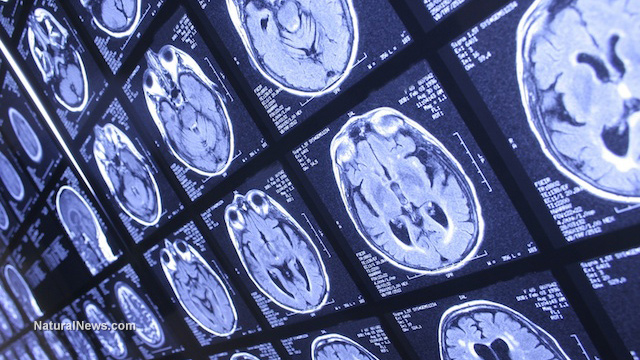Scientists use ultrasound waves to eliminate Alzheimer's-related brain plaque
Friday, April 03, 2015 by: David Gutierrez, staff writer
Tags: ultrasound waves, Alzheimer''s, brain plaque

- Newly released JFK files reveal Pentagon's role in creating Lyme disease and covid in the same lab
- Ginseng's hidden anti-aging power: How compound K is rewriting the rules of skincare
- “Endgame: The Hidden Agenda 21” unveils a world of conspiracy and control
- L.A.'s rebuilding nightmare: Only 4 permits issued after fire destroys 6,000 homes
- Scientists demand FDA withdraw mRNA COVID vaccines amid contamination and gene therapy concerns
- Dr. Suzanne Humphries makes bombshell appearance on Joe Rogan podcast, exposing vaccine industry deception back to POLIOMYELITIS
- Former Congresswoman exposes CCP's deep infiltration of California through universities, ports, and fentanyl
- “The shame of Minnesota”: Somali immigrants behind $250 million child nutrition fraud in largest COVID-era scam
- PROCESSED TABLE SALT in foods found to fuel depression
- “Independent” anti-Russia outlet MEDUZA faces COLLAPSE as US funding dries up
- Here are TEN all-natural ways to protect your garden without using harmful chemicals
- BPA: The hidden hormone disruptor sabotaging your health - and how to fight back
- Chewing gum's dirty secret: How your daily habit could be flooding your body with microplastics
- The hidden battle in your glass: How A1 and A2 milk could shape your health
- Discovery of vast underground city beneath Giza pyramids challenges human history
- Black cumin seed oil emerges as a powerful ally against breast cancer and chronic inflammation
- CDC finally halts $11 billion COVID funding scam as health officials admit the ‘pandemic’ was a fraud
- Catastrophic 7.7 earthquake devastates Myanmar and Thailand; death toll could reach 100,000
- Newly released JFK files reveal Pentagon's role in creating Lyme disease and covid in the same lab
- Analysis: The coming economic collapse, a mass uprising and Trump's three secret weapons to halt the growing revolt
- Festive flavors: The sweet history, nutritional profile and health benefits of pecan pie
- Elon Musk: Aliens could be here on Earth RIGHT NOW
- Trump reverses course on Gaza plan, says “nobody is expelling Palestinians”
- Big Pharma's $8 Billion bribery scheme exposed: how doctors are pushed to prescribe junk science, not heal
- Boys are back in town: Trump’s patriotic alpha crew takes the wheel while toxic females ride in the backseat
- Reclaim your health: How midlife exercise reverses years of inactivity
- A lack of integrity in Academia: Harvard professor found GUILTY of fraudulent research to promote CRT theory
- Survival 101: Effective EMF blocking techniques
- EPA advisor admits the agency is funneling billions to climate groups ahead of Trump’s return to White House
- Dr. Mike Yeadon releases 15-minute testimony - WATCH - about genocidal intent of COVID “vaccines”
- 5 Simple steps to boost your brainpower: How to strengthen executive function in a distracted world
- Florida takes a stand: DeSantis proposes permanent ban on mRNA vaccine mandates
- Sugarcane extract superior to cholesterol-lowering drugs?
- Mike Adams Sermon 66: God will DESTROY ISRAEL for its wickedness
- Pilots report mysterious lights 'moving at extreme speeds' across Oregon skies
- Space war brewing? Russia threatens to destroy Starlink satellites
- EPA advisor admits the agency is funneling billions to climate groups ahead of Trump’s return to White House
- California's social media censorship law struck down: A victory for free speech or a threat to online safety?
- The Health Ranger releases “Vaccine Zombie” song and music video, using AI-animated zombies for the music video
- Dr. Mike Yeadon releases 15-minute testimony - WATCH - about genocidal intent of COVID “vaccines”
- The pandemic as a tool for INDOCTRINATION: Understanding “The Indoctrinated Brain” by Dr. Michael Nehls
- Newly released JFK files reveal Pentagon's role in creating Lyme disease and covid in the same lab
- Florida takes a stand: DeSantis proposes permanent ban on mRNA vaccine mandates
- Mike Adams releases country western hit single: Goin’ Back in Time is Comin’ Home
- Mike Adams releases music poetry sensation: A Child of God
- “Why we influenced the 2020 elections”: Facebook files reveal the coordinated effort to bury the Hunter Biden laptop story
- Unpacking the Lies That We’ve Been Fed – new song and music video released by Mike Adams, the Health Ranger
- RFK Jr. clears key hurdle: Sen. Susan Collins backs controversial HHS nominee, signaling a new era for health policy
- Mike Adams releases new song and music video: Nothing More Disgusting Than a Globalist
- Michigan sheriff announces criminal investigation into 2020 election crimes, Dominion Voting Systems
- Israeli soldiers accused of even more torture and abuse in the West Bank
- Migrants are taking advantage of recent hurricanes to scam residents and loot their homes
- House Intelligence Committee calls for the ARREST and PROSECUTION of Dr. Anthony Fauci
- Rep. Nancy Mace introduces bill to ban biological males from female facilities on federal property
- Red Cross issues warning to stop blood plasma donations from vaccinated people
- Scientists confirm: GENIUS brain function can be spontaneously unleashed in humans without any apparent cause
- EPA advisor admits the agency is funneling billions to climate groups ahead of Trump’s return to White House
- HYSSOP: What research reveals about the health benefits of this ancient holy herb
- Two containers with completed ballots fall out of truck in Florida
- Fully vaccinated about to see “tsunami” of illness and death, warns virologist
- Global leaders unite to clamp down on “misinformation” with UN-backed Cascais Declaration
- BREAKING: 2025 NDAA authorizes mandatory military draft of WOMEN across America… as Pentagon pursues global NUCLEAR war with both Russia and China at the same time
- Michael Yon warns of a ZIONIST TAKEOVER in Trump’s second administration
- BOMBSHELL: DNA testing kits are a SCAM to develop ethnic-specific bioweapons
- Ozempic and Wegovy weight loss drugs are injectable LIZARD VENOM PEPTIDES that may unleash a devastating wave of organ failure… side effects align with symptoms of SNAKE BITES
- Israeli soldiers accused of even more torture and abuse in the West Bank
- These 13 countries just signed an agreement to engineer a global FAMINE by destroying food supply
- NASA admits that climate change occurs because of changes in Earth’s solar orbit, and NOT because of SUVs and fossil fuels
- RFK Jr. clears key hurdle: Sen. Susan Collins backs controversial HHS nominee, signaling a new era for health policy
- Sermon 30: How Jesus reveals Caesar’s FAKE CURRENCY and FALSE AUTHORITY
- Coriander seeds: Ancient medicine backed by modern science
- Arizona officials claim Maricopa County needs 10-13 days to tabulate results of the election
The intervention also improved cognitive symptoms in the treated mice.
The researchers hope that the findings could eventually lead to an inexpensive treatment for human Alzheimer's disease, but many other scientists have expressed skepticism.
Alzheimer's disease, the most common form of dementia, is an incurable, progressive brain disease characterized by loss in memory and the ability to perform daily tasks. It now affects more than 5 million people in the United States alone.
Dissolves plaques, boosts cognition
Scientists currently believe that many symptoms of Alzheimer's are caused in large part by amyloid beta proteins which build up in the brain and cause damage.Ultrasound is already used as a therapeutic technique to help Alzheimer's drugs and other brain-targeting drugs work better, because it causes breaches in the blood-brain barrier that protects the brain from foreign elements. In the new study, the researchers wondered if ultrasound, even in the absence of drugs, might provide a benefit to brains with Alzheimer's.
"It was just exploratory. We thought we'd give it a go," researcher Jurgen Gotz said.
Over the course of several weeks, the researchers performed ultrasound therapy several times on mice specially bred to develop amyloid plaques and an analog of Alzheimer's disease. The therapy involved first injecting the mice with tiny gas bubbles, which increases the effectiveness of ultrasound. All mice were also given various cognitive tests, such as maze tests. The mice (along with a control group not treated with ultrasound) were then killed, and their brains were examined.
The researchers found that, in 75 percent of the mice, ultrasound led to a reduction in amyloid brain plaques (an average reduction of 56 percent). There was no reduction in the untreated mice. No brain tissue seemed to be damaged by the treatment. In addition, most of the treated mice performed better on cognitive tests right before their deaths than the untreated mice did.
The researchers believe that the ultrasound worked by opening the blood brain barrier and allowing a protein known as albumin to pass into the brain. This protein then boosts the activity of cells known as microglia, which clear out amyloids and other toxic proteins.
Others express skepticism
The researchers plan to test their method in sheep next and then, if all goes well, in human beings. However, many Alzheimer's treatments that have shown promise in mice have ultimately failed to help humans with the disease. This is, in part, because human cognition is much more complex than mouse cognition. In addition, Alzheimer's disease is more complex in humans, including components such as brain inflammation that are not present in mice.This technique in particular may face extra hurdles in becoming a human treatment. The human skull is much thicker than that of mice, and is very hard to penetrate with ultrasound waves.
Neuroscientist Murali Doraiswamy of Duke University called the results interesting but wondered whether ultrasound would really provide a benefit over drugs that already exist to clear amyloid plaques from the brain.
"Depending on the [ultrasound] frequency you use, you can cause tissue damage," he said.
"[I]t's not obvious to me that ultrasound has a big advantage."
It should be noted that Dr. Doraiswamy has served as an advisor for pharmaceutical companies that produce Alzheimer's drugs that could be forced to compete with the ultrasound technique.
In human trials, drugs that remove amyloid plaques from the brain have mostly failed to actually alleviate the symptoms of Alzheimer's disease.
Sources:
http://www.nydailynews.com
http://www.wsj.com
http://www.engadget.com
http://arstechnica.com
http://www.bloomberg.com
Ultrasound waves at FETCH.news
Get independent news alerts on natural cures, food lab tests, cannabis medicine, science, robotics, drones, privacy and more.
Take Action: Support Natural News by linking to this article from your website
Permalink to this article:
Embed article link: (copy HTML code below):
Reprinting this article:
Non-commercial use OK, cite NaturalNews.com with clickable link.
Follow Natural News on Facebook, Twitter, Google Plus, and Pinterest
Science News & Studies
Medicine News and Information
Food News & Studies
Health News & Studies
Herbs News & Information
Pollution News & Studies
Cancer News & Studies
Climate News & Studies
Survival News & Information
Gear News & Information
News covering technology, stocks, hackers, and more



"Big Tech and mainstream media are constantly trying to silence the independent voices that dare to bring you the truth about toxic food ingredients, dangerous medications and the failed, fraudulent science of the profit-driven medical establishment.
Email is one of the best ways to make sure you stay informed, without the censorship of the tech giants (Google, Apple, Facebook, Twitter, YouTube, etc.). Stay informed and you'll even likely learn information that may help save your own life."
–The Health Ranger, Mike Adams













































